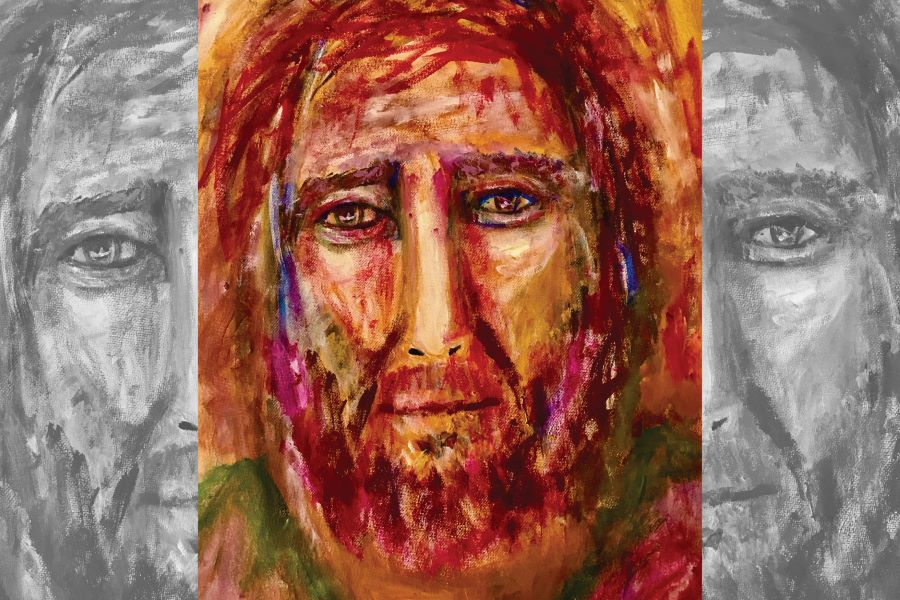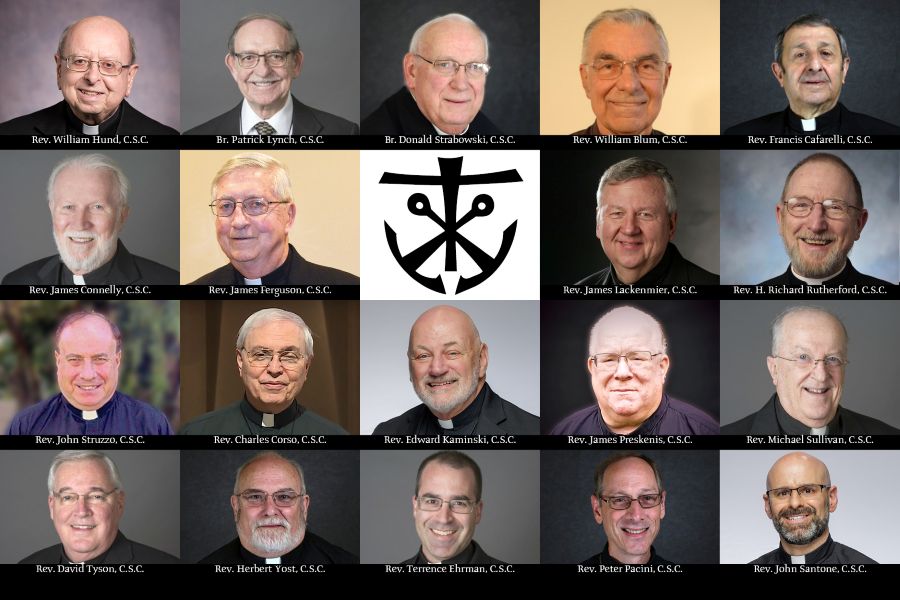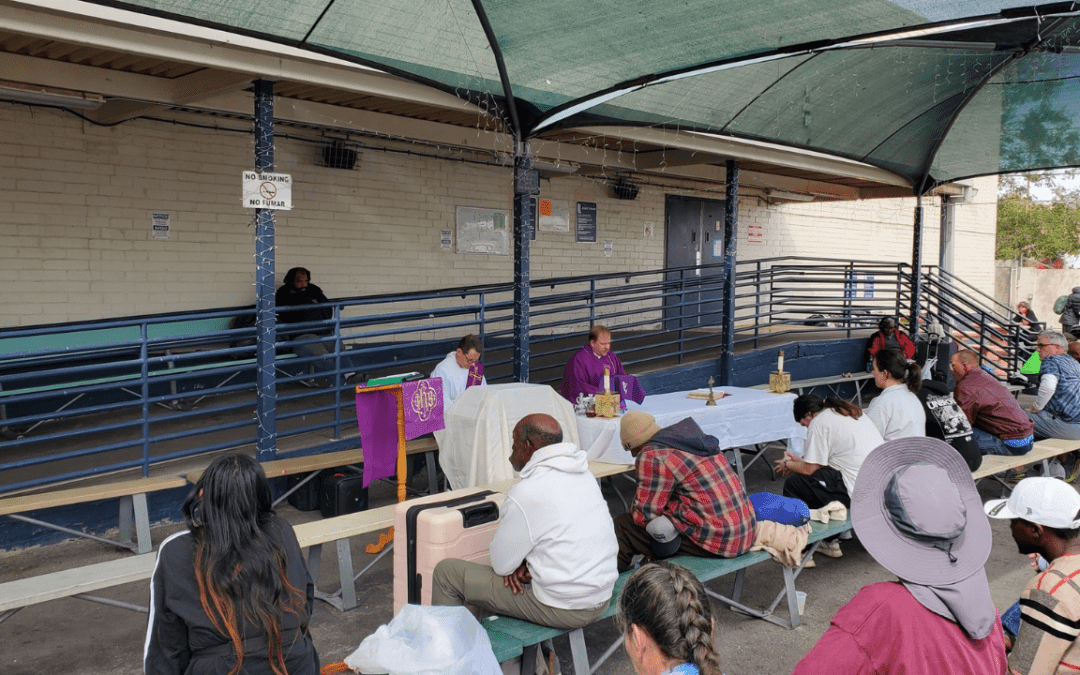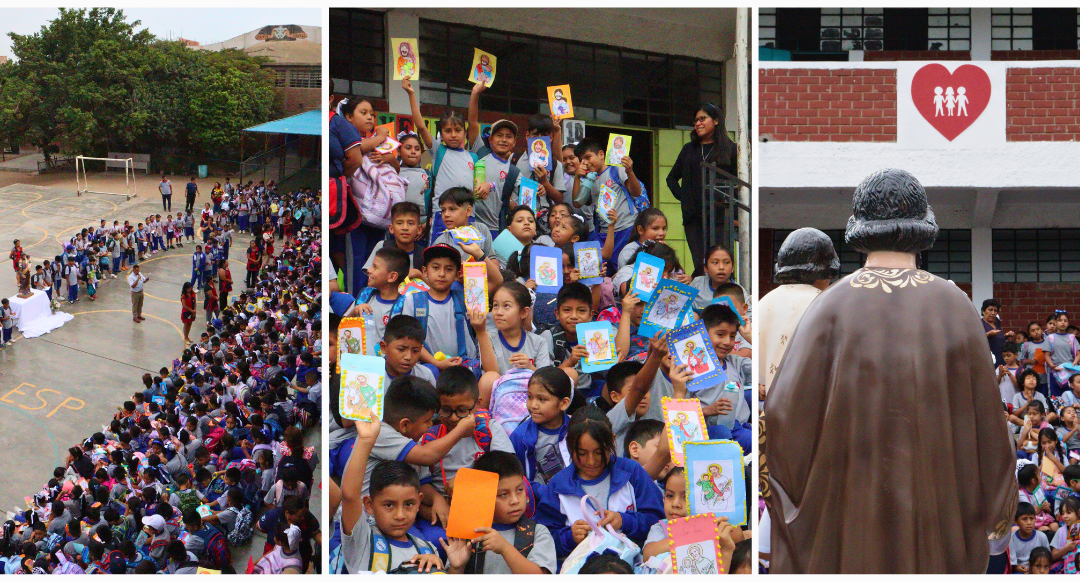By Rev. Ronald Raab, C.S.C.
On the first Sunday of Lent, we proclaim Mark 1:12-15 at Mass. After Jesus’ baptism, the Holy Spirit led him into the ruthless land of strong heat, penetrating sun, and forty days of fasting. In the desert, Jesus confronts the brutality of the environment. Jesus is tempted by evil. He overcomes his anguish. The desert experience of Jesus becomes the central image of our Lenten journey. This gospel invites us to follow Jesus into a brutal desert in order to discover genuine healing and authentic life.
Years ago, while in college, I studied in the Holy Land during the summer. Our group traveled to an expansive desert. We traversed over barren rock while burning in the sun’s heat. The foreign land to me seemed incapable of life. We walked to the edge of a cliff, then looking out beyond us to the other side of a hill, we all noticed something that stopped us in our tracks. Across the hill, a line of greenery flowed down the barren land. A small stream created beautiful, lush shrubbery. Life sprang up with just a small amount of water. The brutality of the environment was eased even by the idea that in the desert, life is possible.
Since that summer, I have prayed with this image of the earthly desert, of greenery emerging from nothingness. Sometimes, the barrenness of that desert is nothing compared to my inner life. My heart is often a dry place of brutal turmoil. My inner life is often desolate and lonely. Anger is a treacherous landscape. My prayer is often the ground upon which I ache for change or healing. The physical desert of the Holy Land has become an interior landscape and experience of seeking Jesus’ love, especially on this journey to Easter renewal. I return to this desert in my heart and memory every year in Lent.
In Lent, our inner lives may seem just as treacherous and barren. The image of the Lenten desert reveals to us that in Christ, all things are possible. In this season, we journey to Easter to renew our life in Christ in baptism. In these waters, we are born again, we discover life amid our inner pain and turmoil. The landscape of the heart is given new growth, even when we feel overwhelmed by the immensity of human suffering. In Christ, even our thoughts, reactions, and voices discover new life. This new life is a surprise and delight, an unexpected growth along the contour of our hearts.
The personal desert experiences of people also teach me about our quest for God’s love. I am in awe overhearing people’s anguish and survival stories. I listen to a young woman slowly tell me the story of losing a child. Such a desert place becomes a sacred story. I listen with tears as the path of such a story unfolds. I listen to such sacred words at the bedside of a prisoner dying of cancer. At her hospital bedside, a guard stands in command wearing a bullet-proof vest and carrying a gun. In that holy moment, she is free of her inner desert place of regret and shame. I listen to the anguish of a young father tell me of being abused as a child. The terrain of such a story guides us both into silence.
Such emotional and spiritual deserts have taught me over the years not to judge other people. We are all shaped in thought and in deed by the deserts we have traveled in life. I have learned in many Lenten seasons of my priesthood to listen with a tender heart and a non-condemning ear. It is the privilege of my life and ministry to have been invited into the personal desert stories of so many people in the parishes in which I have served. Desert places of the heart are universal, though anguish is so personal.
Jesus entered the desert for forty days. Our deserts may not have a time limit on them. Some of us have carried such desolate places within us for most of our lives. Some spiritual dry places may never be healed and certainly not forgotten. Some personal deserts just need to be traversed in the sacred moment during the Sacrament of Reconciliation in a new Lenten season. Some desolations may become lifegiving simply by sharing deeply with someone who understands such desert experiences. No matter our sins, our doubts, our scars of life, our deserts are not easily changed. Sometimes, we cling to our deserts because it is the only life we know. Only in God can our suffering be healed and our perspectives changed.
Jesus confronted every aspect of the physical desert. In doing so, he was empowered by the Holy Spirit. Jesus also confronts our inner suffering. Jesus desires us. He wants the best for us. He wants our anguish to heal. In our bewildered moments, he chases us down, carrying us as lost sheep. Jesus invites us on another Lenten journey through the desert to renew our lives again at Easter. Like the stream flowing down the desert hill, Jesus is the life we seek when our hearts remain dull, lifeless, and hurting. All things are possible with God in our inner deserts.
Jesus did not resist the desert. He did not hesitate to be changed by it, to become stronger for his mission on earth. I admit, that I often find myself resisting God during Lent. There is still something in me that tells me I don’t want to change; I don’t want what Jesus offers me. I encounter this resistance every year in Lent. My resistance melts in Lent only with honest prayer and the support of the sacraments. I cannot live or become stronger through my own pain without the sustenance of God’s fidelity. I cannot travel through my own desert without God in communal ritual, personal silence, and sharing my life with others in the community.
Jesus fasted in his desert experience. We fast as to become hungry for God’s mercy, fidelity, and presence. We fast to be sustained more deeply in God’s love for us. We all desire God in our pain, our anguish, and our unanswered questions in life. However, we may still cling to other things that we think will feed us, such as technology, pornography, stuff we purchase, our just, and our own stubbornness of heart. In Lent, God transforms our hunger into love and a deeper meaning in life. The food we feed upon every day becomes who we are in the world. We are what we consume, what we cling to, and all that surrounds us. In Lent, we have another chance to let God be the source of our life in the Eucharist. Christ feeds us with hope, mercy, and forgiveness. Our hunger leads us to belong in Christ’s passion, death, and resurrection.
No matter the deserts we face in this Lenten journey, God desires to accompany us. Our call in Lent is to listen. Our way forward in the uphill climb of desert temptations is to listen even more attentively to Christ in the quiet places of our hearts. Listening to Christ is the form of prayer most often forgotten and even resisted during our journey toward the glory of Easter. Our communal expressions of prayer are utterly important in the Lenten season such as Mass, the Sacrament of Reconciliation, or the more devotional prayers of The Stations of the Cross or the Rosary. However, listening to the ways of Christ in our lives becomes the place of inner freedom in the heat of our desert experiences of loss, grief, and uncertainty. May we not fear Lent’s desert.
As we enter the Lenten season, I invite you to listen carefully to God and to renew your own baptismal life in Christ Jesus. As we pray, as we fast, and as we offer alms to God’s beloved poor, the Holy Spirit is guiding us through the deserts of hopelessness, fear, and uncertainty. On Easter, our voices shall be one, and our lives committed again to the joy of our relationship with Christ who turns the heat of the desert into the fires of commitment in our Christian communities.
Prayer: As We Enter Unstable Terrain
God of ancient mercy,
Guide us in the heat of Lenten days.
Help us sort through our regrets of the past.
May our uphill struggles become a level path to you.
Shield our hearts when anguish races within us.
Open us to your healing love when shame halts us.
Clear away our heart’s resistance along our walkway.
Shepherd us when we are lost in the burning sun.
Help us speak the truth of our sin and misfortune.
Show us how to voice the complexities of our lives.
Offer us words of love and miracles of reconciliation.
Raise up the volume of our praise for you this Lent.
May every ache of our heart be known to you alone.
May we not fear our journey across barren shame.
May your generous grace heal every division within us.
May baptismal waters break and we be birthed again.
May pardon and peace flourish within your people.
May your grace become overflowing love.
Amen
—————-
About:
Rev. Ronald Patrick Raab, C.S.C., serves as religious superior of Holy Cross House, our retirement and medical facility at Notre Dame, Indiana. He is an award-winning author, blogger, and visual artist. Learn more at ronaldraab.com
Artwork:
Fr. Ron painted this image of Jesus in the desert several years ago. The acrylic painting suggests the heat and brutality of Jesus’ experiences for forty days in the wasteland.
Published: January 15, 2023




